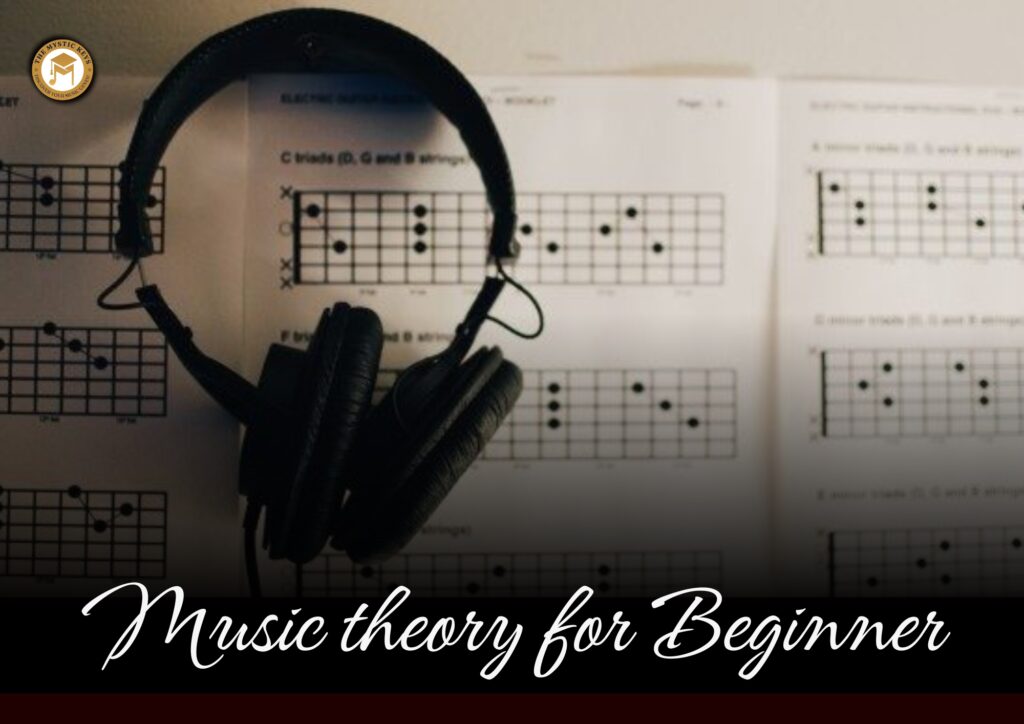Why Music Theory Matters | A Beginner’s Perspective
Starting your journey into the world of music is an exciting experience. Whether you’ve just picked up an instrument, begun exploring your voice, or started composing melodies, music can feel like a magical space of infinite possibilities. However, to truly unlock the potential of your musical journey, there’s one vital tool you’ll need: music theory for beginners.
Many beginners view music theory as a dry or complex subject, often wondering if it’s really necessary. The answer is a resounding yes. Music theory is the foundation upon which all musical skills are built. It’s not just about memorizing rules—it’s about understanding the language of music, uncovering its secrets, and empowering your creativity. In this blog, we’ll dive deep into why music theory matters, especially for beginners, and how it can transform the way you engage with music.

Understanding the Language of Music
Imagine moving to a foreign country without knowing the language. Communication would be difficult, if not impossible. Music, too, is a language—one that speaks directly to the heart but is built on a structured system of notes, rhythms, scales, and chords. Music theory is the grammar and vocabulary of this universal language.
For a beginner, music theory provides clarity. It answers questions like:
- Why do certain notes sound good together?
- How are melodies constructed?
- What is the purpose of a time signature or a key signature?
Understanding these concepts doesn’t just make music more accessible—it makes it more enjoyable. When you grasp how music works, you’ll find yourself appreciating its intricacies on a deeper level.

Building a Strong Foundation for Musical Growth
Music theory isn’t just for advanced musicians. In fact, the earlier you start learning it, the better. It lays the groundwork for everything you’ll encounter in your musical journey.
For instance, as a beginner, you’ll learn about the major and minor scales. These scales are the building blocks of most Western music. Knowing them will help you:
- Recognize and play melodies.
- Understand how chords are formed.
- Create simple but effective improvisations.
Without a solid understanding of these basics, you may feel lost as you try to progress to more complex pieces or techniques. Music theory ensures that your growth as a musician is steady and grounded.

Unlocking Creativity
One of the biggest myths about music theory is that it stifles creativity. Some beginners fear that learning the “rules” of music will limit their artistic expression. In reality, the opposite is true. Music theory doesn’t confine you—it frees you.
When you understand music theory, you gain tools to experiment with confidence. Want to write a song? Theory shows you how to structure it. Curious about creating unique harmonies? Theory explains which notes complement each other. Interested in improvisation? Theory provides a roadmap so you can express yourself without fear of hitting a wrong note.
For example, if you know how chords are constructed, you can modify them to create new sounds. A simple major chord can be transformed into a suspended chord, a diminished chord, or an augmented chord—all with just a small adjustment. These small tweaks can make a big difference in the emotional impact of your music.

Demystifying Complex Concepts
As a beginner, music might sometimes feel like a mysterious art form, especially when you encounter complex compositions or advanced players. Music theory helps break down this complexity. It gives you a framework to understand what’s happening beneath the surface of a piece of music.
For example:
- Why does Beethoven’s “Moonlight Sonata” evoke such deep emotion? Music theory explains how the use of minor keys and dynamic contrasts achieves this effect.
- How does jazz improvisation work? Theory reveals the use of modes, chord extensions, and scales in crafting spontaneous solos.
When you understand the “why” behind the music, your appreciation grows, and your ability to replicate or innovate increases exponentially.

Enhancing Collaboration
Music is rarely a solo endeavor. Whether you’re playing in a band, singing in a choir, or jamming with friends, collaboration is at the heart of musical experiences. Music theory acts as a common language among musicians, ensuring everyone is on the same page.
Imagine this scenario: You’re at a jam session, and someone suggests, “Let’s play a 12-bar blues in E.” Without knowledge of music theory, you might feel excluded, unable to participate. However, with even a basic understanding of scales, keys, and progressions, you can confidently join in, adding your unique voice to the mix.
Music theory doesn’t just make collaboration easier—it makes it more rewarding. You’ll feel empowered to share ideas, contribute meaningfully, and connect with other musicians on a deeper level.

Boosting Confidence and Efficiency
One of the most common challenges for beginners is a lack of confidence. You might worry about playing the wrong note, forgetting a chord, or not understanding a piece. Music theory eliminates much of this uncertainty.
For example:
- If you’re struggling to play a song in a different key, theory teaches you how to transpose it.
- If a melody doesn’t sound right, theory helps you identify the issue—perhaps you’re using a note outside the key.
This knowledge boosts your confidence, allowing you to approach practice sessions and performances with assurance. Additionally, music theory saves you time. Instead of relying on guesswork or rote memorization, you’ll understand the underlying structure of music, making learning faster and more efficient.

Preparing for Advanced Musical Concepts
Every master musician started as a beginner. What sets them apart is the foundation they built early on. Music theory is essential for advancing to higher levels of musicianship. Concepts like counterpoint, modulation, and extended harmonies may seem daunting, but they’re all rooted in basic theory.
Even genres that rely heavily on improvisation, like jazz or blues, require a strong theoretical background. For example, jazz musicians often use modes and chord extensions to craft their solos. Without knowledge of these elements, improvisation can feel overwhelming or aimless.
By starting with music theory, you’re setting yourself up for long-term success, ensuring that you can tackle more advanced challenges with ease.

Deepening Your Appreciation for Music
Finally, music theory for beginners not only enhances your ability to create but also deepens your ability to appreciate music on a whole new level. For instance, when you listen to a symphony, a pop song, or even a film score, music theory allows you to hear beyond the surface. You’ll start to recognize the clever use of motifs, appreciate the emotional impact of key changes, and identify the subtle interplay of rhythms and harmonies.
As a result, this deeper understanding transforms music from being just a form of entertainment into a profound art form that you can analyze, admire, and continually be inspired by.

How to Start Learning Music Theory
If you’re ready to dive into music theory, here are some tips to get started:
- Focus on Basics: Start with notes, intervals, scales, and chords. These are the building blocks of music.
- Use Practical Applications: Apply what you learn to your instrument or voice. For example, practice scales while playing your guitar or piano.
- Seek Resources: Explore beginner-friendly books, apps, and online courses. Many resources break down complex topics into manageable lessons.
- Practice Regularly: Consistency is key. Dedicate time each day to learning and applying theory.
- Join a Class: Consider enrolling in music classes, where a teacher can guide you through the process and clarify any doubts.

Conclusion
For beginners, music theory might seem like an intimidating subject, but it’s one of the most rewarding investments you can make in your musical journey. It provides the tools you need to understand, create, and appreciate music on a deeper level. Whether your goal is to play your favorite songs, compose original pieces, or connect with other musicians, theory is the key that unlocks all of these possibilities.
Remember, every musician—no matter how talented—was once a beginner. By embracing music theory, you’re setting yourself up for a lifetime of musical growth, creativity, and enjoyment. If you’re looking for guidance to start your journey, consider joining The Mystic Keys, where expert instructors make music theory approachable and fun. With personalized lessons and a supportive community, you’ll gain the confidence and skills to thrive as a musician. So don’t shy away from it—dive in, and let music theory be your guide to the beautiful world of music!








